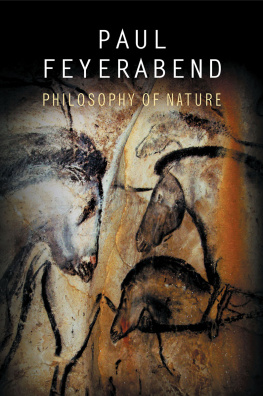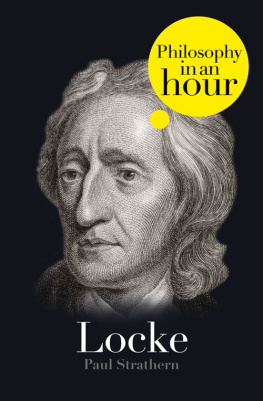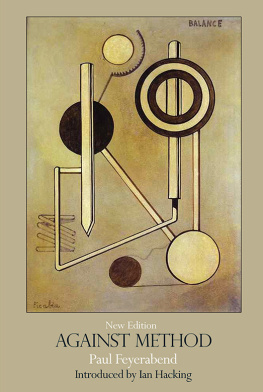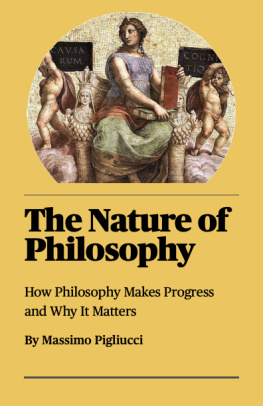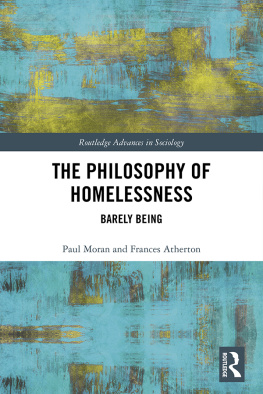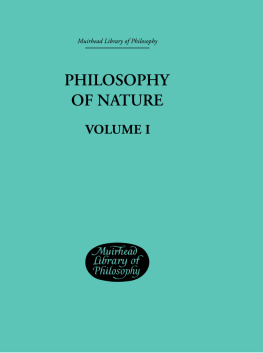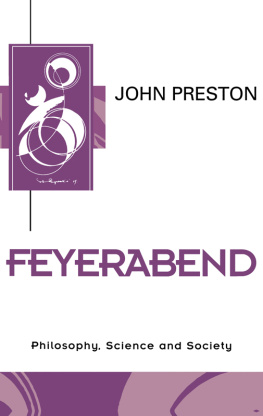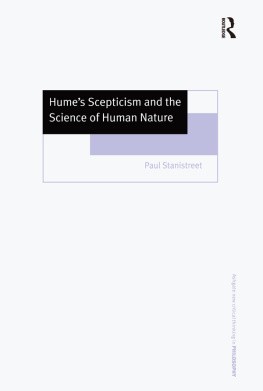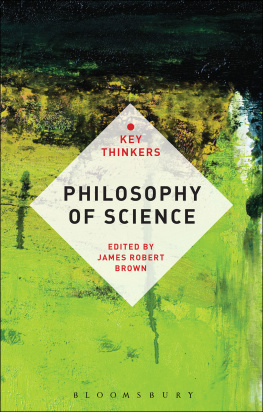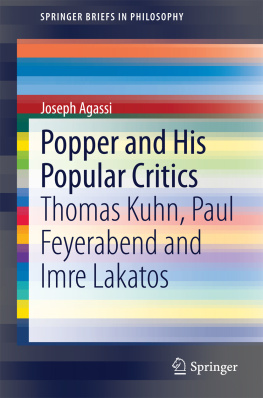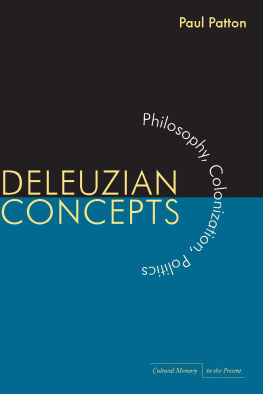Feyerabend Paul K - Philosophy of Nature
Here you can read online Feyerabend Paul K - Philosophy of Nature full text of the book (entire story) in english for free. Download pdf and epub, get meaning, cover and reviews about this ebook. City: Cambridge;UK, year: 2018;2016, publisher: Polity Press, genre: Religion. Description of the work, (preface) as well as reviews are available. Best literature library LitArk.com created for fans of good reading and offers a wide selection of genres:
Romance novel
Science fiction
Adventure
Detective
Science
History
Home and family
Prose
Art
Politics
Computer
Non-fiction
Religion
Business
Children
Humor
Choose a favorite category and find really read worthwhile books. Enjoy immersion in the world of imagination, feel the emotions of the characters or learn something new for yourself, make an fascinating discovery.
- Book:Philosophy of Nature
- Author:
- Publisher:Polity Press
- Genre:
- Year:2018;2016
- City:Cambridge;UK
- Rating:5 / 5
- Favourites:Add to favourites
- Your mark:
- 100
- 1
- 2
- 3
- 4
- 5
Philosophy of Nature: summary, description and annotation
We offer to read an annotation, description, summary or preface (depends on what the author of the book "Philosophy of Nature" wrote himself). If you haven't found the necessary information about the book — write in the comments, we will try to find it.
Philosophy of Nature — read online for free the complete book (whole text) full work
Below is the text of the book, divided by pages. System saving the place of the last page read, allows you to conveniently read the book "Philosophy of Nature" online for free, without having to search again every time where you left off. Put a bookmark, and you can go to the page where you finished reading at any time.
Font size:
Interval:
Bookmark:

Paul Feyerabend
Edited with an Introduction by Helmut Heit and Eric Oberheim
Translated by Dorothea Lotter with assistance from Andrew Cross
polity
First published in German as Naturphilosophie, Suhrkamp Verlag, Frankfurt am Main, 2009
This English edition Polity Press, 2016
The translation of this work was supported by a grant from the Goethe-Institut which is funded by the German Ministry of Foreign Affairs.
Polity Press
65 Bridge Street
Cambridge CB2 1UR, UK
Polity Press
350 Main Street
Malden, MA 02148, USA
All rights reserved. Except for the quotation of short passages for the purpose of criticism and review, no part of this publication may be reproduced, stored in a retrieval system, or transmitted, in any form or by any means, electronic, mechanical, photocopying, recording or otherwise, without the prior permission of the publisher.
ISBN-13: 978-0-7456-9476-4
A catalogue record for this book is available from the British Library.
Library of Congress Cataloging-in-Publication Data
Names: Feyerabend, Paul, 1924-1994, author.
Title: Philosophy of nature / Paul Feyerabend.
Other titles: Naturphilosophie. English
Description: English edition. | Malden, MA : Polity, 2016. | Includes bibliographical references and index.
Identifiers: LCCN 2015042820| ISBN 9780745651590 (hardcover : alk. paper) | ISBN 0745651593 (hardcover : alk. paper)
Subjects: LCSH: Philosophy of nature.
Classification: LCC BD581 .F4413 2016 | DDC 113--dc23 LC record available at http://lccn.loc.gov/2015042820
The publisher has used its best endeavors to ensure that the URLs for external websites referred to in this book are correct and active at the time of going to press. However, the publisher has no responsibility for the websites and can make no guarantee that a site will remain live or that the content is or will remain appropriate.
Every effort has been made to trace all copyright holders, but if any have been inadvertently overlooked the publisher will be pleased to include any necessary credits in any subsequent reprint or edition.
For further information on Polity, visit our website: politybooks.com
An enthusiastic and very engaged student whose talents are far above average. At times he may give in to the urge to make impertinent comments. These remarks were entered on Feyerabends report for the 1939/40 school year by teachers of Viennas Public High School for Boys (Staatliche Oberschule fr Jungen). More than a few others would later record similar experiences in their interactions with him. Feyerabend was undoubtedly one of the most remarkable and controversial philosophers of science in the twentieth century, one who even drew attention outside the world of higher education. He had multiple interests and was interesting to many. While there is hardly any doubt about his above-average talents, assessments of his level of engagement are occasionally less enthusiastic. Feyerabend had a reputation for not being an excessively eager, committed, and thorough researcher, which was due at least in part to his nonchalant manner and snide remarks about the learned knowledgeableness of his colleagues. More than a few interpreted some of his remarks as unwelcome impertinent comments, much as did his former teachers. And in the course of a general reckoning with certain relativistic and skeptical developments in philosophy of science, the journal Nature labeled Feyerabend the Salvador Dali of academic philosophy and currently the worst enemy of science (Theocharis and Psimopoulos 1987: 596). However, according to the authors of that piece, in this respect Feyerabend was just a little ahead of Karl Popper, Thomas Kuhn, and Imre Lakatos, since philosophical reflection on science on the whole was undergoing an undesirable development. From that point of view Feyerabend had a place in the company of the classic figures of post-positivist philosophy of science. Of the Big Four in twentieth-century philosophy of science, however, it is Feyerabend to whom the label enemy of science has mainly stuck, first in a manner suitable for the media (Horgan 1993) and later, posthumously, as an ambivalent honorary title (Preston, Munvar, and Lamb 2000).
This volume of Philosophy of Nature is well suited to shed new light on Feyerabends work and philosophical development as well as on his alleged hostility to science. In what follows we would like to introduce the reader to this text in three steps. (1) In the first step, after beginning with a brief initial summary of Feyerabends philosophical development, we will reconstruct the history of this volume and give the reasons why its publication was delayed for more than thirty years. (2) In the second step, we will explore the special significance of the manuscript both for Feyerabend research and for our understanding of the development of our conceptions of nature. In Philosophy of Nature, Feyerabend presents himself as an interpreter of early Greek thought and a genealogist of Western rationalism. Thus, this text reveals a fascinating perspective not only on the history of philosophy of nature, but also on some hitherto little-explored aspects of Feyerabends thought. At the same time, this work from the early 1970s constitutes a core resource for our understanding of the similarities and differences between the early and the late Feyerabend. It is the missing link for our understanding of Feyerabends later radicalization and of its justification and its scope within the continuum of his thought. (3) The final part of the introduction provides an overview of the structure and contents of Feyerabends Philosophy of Nature.
Feyerabends philosophy has always been intimately connected with the scientific and philosophical discussions of his time, and he frequently participated directly in these discussions through his personal contacts. In the late 1940s, while studying in Vienna under Felix Ehrenhaft and Victor Kraft, he obtained some direct insights into the logical positivism of the Vienna Circle and its problems, which were of fundamental importance for the continuing development of philosophy of science on an international level. During this time, he also met Ludwig Wittgenstein, before deciding to accept an offer to work for Karl Popper in London. In the early 1950s, Feyerabend met with Niels Bohr a few times and became one of the most prominent philosophical critics of what would later be known as the Copenhagen interpretation of quantum mechanics. In 1962, along with Thomas Kuhn, his colleague at the time at the University of California, Feyerabend initiated the historical turn in philosophy of science, which subsequently adopted a stronger focus on the history and sociology of the sciences instead of regarding science exclusively as a logical system. During the 1970s, he became a strong critic first of Karl Poppers thought and his school of philosophy, and later of rationalism in a more fundamental sense. The catchphrase Anything goes from Against Method (Feyerabend 1975a, 1975b) drew attention both within and beyond academic philosophy. His subsequent works, especially Science in a Free Society (1978a, 1978b), Science as Art (1984a, 1984b), and Farewell to Reason (1987b, 1987c), were important contributions to a general discussion about the potentials and limits of the sciences in the Western world, as it was conducted in connection with postcolonial, postmodern, and ecological trends in the last third of the twentieth century. The potentials and limits of a scientific worldview are also themes in his final, posthumously published book,
Font size:
Interval:
Bookmark:
Similar books «Philosophy of Nature»
Look at similar books to Philosophy of Nature. We have selected literature similar in name and meaning in the hope of providing readers with more options to find new, interesting, not yet read works.
Discussion, reviews of the book Philosophy of Nature and just readers' own opinions. Leave your comments, write what you think about the work, its meaning or the main characters. Specify what exactly you liked and what you didn't like, and why you think so.

